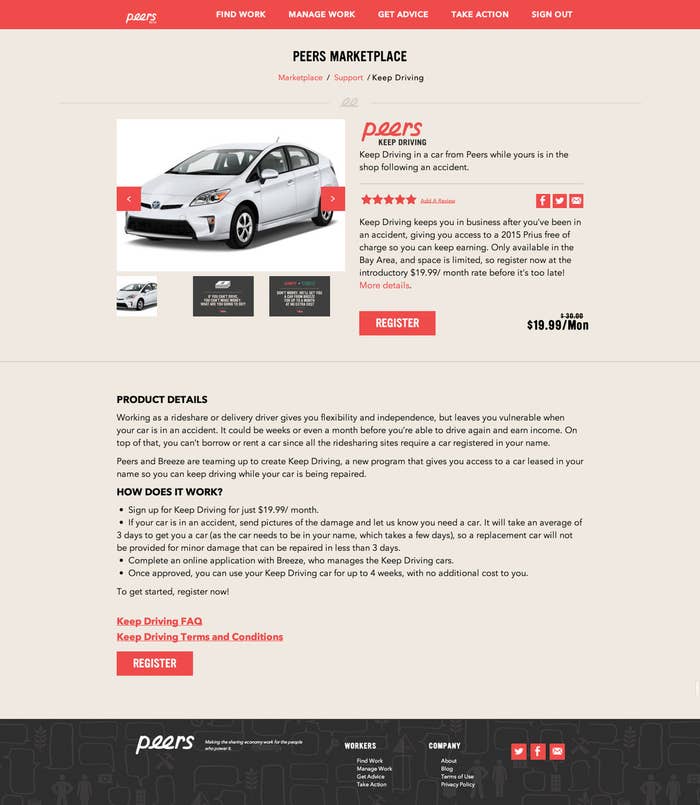
As the sharing economy grows, so do the needs of its contract workers.
"There is an emerging sharing economy workforce," Peers executive director Shelby Clark told BuzzFeed News. "It's totally different than anything we've ever seen before, it has new needs. So we need to create new products and services that meet those needs."
To that end, Peers, an online community for sharing economy workers — which according to Clark boasts a quarter of a million people in the network — is rolling out two of the first programs to be made available to its networks of workers on the site's support marketplace: Homesharing Liability Insurance and Keep Driving.
The Homesharing Liability Insurance program aims to provide peace of mind to people who rent out their traditional residences (no tree houses or igloos yet) on platforms like AirBnB, VRBO, and HomeAway.
"This provides a million-dollar personal liability coverage of anything that happens while you are renting out your home," Clark said. "Many people don't realize personal insurance may not cover commercial use. They may not realize they were at risk."
For $36 a month, Peers members can buy homesharing insurance through United Specialty insurance company and made available by insurance broker Porter and Curtis, Clark said.
Keep Driving, targets the ridesharing or car service economy. Peers is partnering with short-term car lease startup Breeze to provide up to a month-long leases of cars to drivers whose cars may be being repaired as a result of an accident. As part of the program, Peers is fronting all the initial costs that an Uber or Lyft driver would have to undertake in renting from Breeze directly. According to Breeze head of operations Fernando Rodriguez and chief executive and co-founder Jeffrey Pang, the initial costs include a $250 initiation fee and the cost of insurance, which can vary, and the cost of the lease which comes to $28 a day. Though, both Pang and Rodriguez told BuzzFeed News, that rate only applies to the current business model of the company — which was founded earlier this year — and may change as the company evolves.
For a monthly membership fee of $19, Peers will cover all costs ("We just want to make it as easy as possible for drivers," Clark explained,) and all the drivers will be left to pay is the membership fee.
Keep Driving, however, is only available in the San Francisco/Bay Area as of right now. The program offers a sort of backup plan for drivers during accidents or car repairs but requires that a driver is registered as a member of the program and pays the monthly fee. But so far, that hasn't seemed to cause concern among drivers in the company's initial focus groups.
"Based off initial interest, drivers seems really excited about it," Clark said. "For the price of one or two rides a month they can give themselves peace of mind. The reaction we've gotten is really quite positive."
In fact, the program launches today with its first subscriber: Michael Bendorf, a full-time Lyft driver, who was rear-ended during Thanksgiving week.
"I've been out of commission for about a week and a half and you don't want to be in an accident during a holiday week," Bendorf told BuzzFeed News. "I finally got my car into a repair shop and they said it's going to be two to three weeks before it's done."
Bendorf, who was invited to be part of a Peers focus group and was later asked to test drive the program, said when he's not working for Lyft he's not earning money. "[Keep Driving] is now going to enable me to get back on the road," he said. "I can make $1500 to $1800 a week driving for Lyft. As far as I know it's just the $20 a month membership fee, so I think it's well worth it." Through the program, drivers can lease cars under their own name (which is required by insurance companies in order to operate the car as for-hire vehicles) for up to a month.
Peers, which has a team of just five employees, focused much of their time and resources on offering these two initial products in their support marketplace and don't have their sights set on their next product yet.
"What we are trying to do is create a dialogue with the community," Clark said.
"Specifically, we were hearing people talk about feeling vulnerable and being concerned about stability of income. [Workers] said they find the sharing economy liberating... and flexible. But they're coming across problems they never had to deal with before. [We] wanted to help them figure out how to keep their income stable and rely on it."
